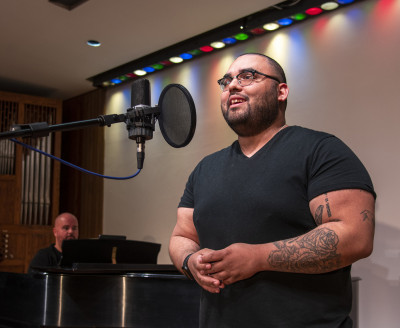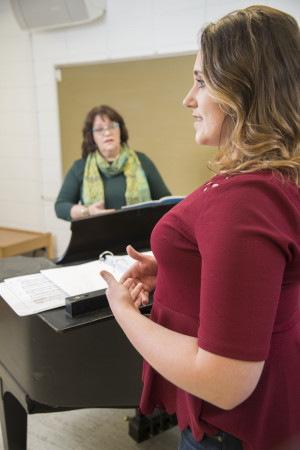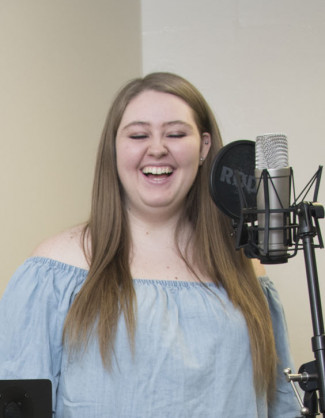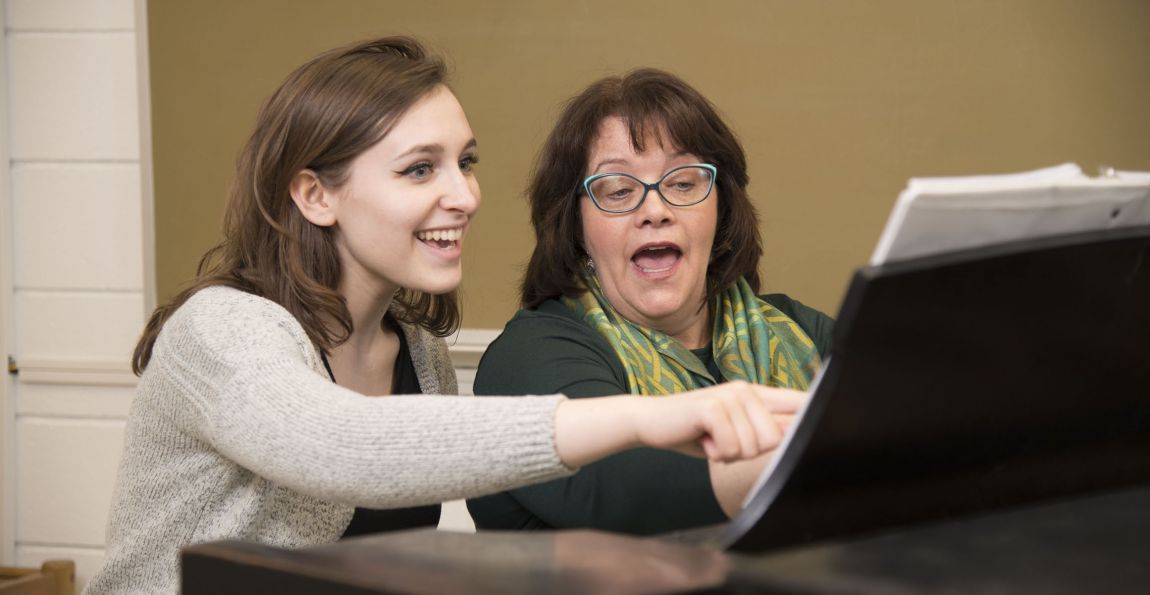Music Theatre Vocal Pedagogy
M.M. in Music Theatre Vocal Pedagogy
The master’s program in music theatre vocal pedagogy features seminar courses in vocal pedagogy, application, and integration courses in voice performance in music theatre style, and analysis courses that focus on repertoire and rehearsal techniques. Students have the option for the one-year accelerated program or a two- year program.
M.M. students will be able to employ a variety of instructional techniques that support efficient and effective voice performance practice. They will develop individual research and creative projects that allow them to engage musically, artistically, and intellectually in the field of music theatre voice performance.

The M.M. in Music Theatre Vocal Pedagogy is designed with you in mind.
It is:
- Accredited by the National Association of Schools of Music.
- Flexible. There are options for full- or part-time study.
- Accelerated. Apply as a member of our intensive 1-year cohort.
- Practical. Applied teaching experience will develop your skills and your resume.
- Interdisciplinary. Just like the field of music theatre, the M.M. program at Carthage creates connections between the study of the voice and other fields of music theatre, giving you maximum professional opportunities.
- Connected. Graduate students will belong to a global network of music theatre vocal pedagogues. All graduate students will be members of Music Theatre Educator’s Alliance International (MTEA). Graduate students can also join the Carthage student chapter of the National Association of Teachers of Singing (NATS) and participate in professional development activities and workshops.
- Global. Our program draws students from the United States, Asia, South America, Africa, and Europe. Students in the cohort develop international friendships and perspectives.

Graduates of the M.M. Program at Carthage will be able to:
- Analyze and interpret music theatre repertoire from a broad range of styles, and apply those understandings in performance.
- Demonstrate an awareness of a broad range of pedagogical concepts, and apply these concepts appropriately in a variety of educational settings.
- Conduct scholarly research in music theatre vocal pedagogy.
- Demonstrate and apply understandings of equity and inclusion within applied voice teaching and the field of music theatre.
- Understand the connections among the sub-disciplines of music theatre, and the impact and intersection with music theatre vocal pedagogy.
- Describe basic information about health and safety within the context of practice, performing, teaching, and listening.
Shaping voices around the country and beyond
Many of our Master of Music alumni hold full-time faculty positions at universities around the country — enhancing the quality of music theatre faculty all over. Learn more about our alumni
Your Next Steps
Degree Requirements
In order to earn the M.M. in Music Theatre Vocal Pedagogy, students must earn a cumulative GPA of 3.0 or higher. They must successfully complete all 36 credits in the program, including the Competency Exam and Capstone Project (Master of Music Thesis Project). The M.M. in Music Theatre Vocal Pedagogy includes the following required courses:
-

- MUS 5200 Contemporary Vocal Pedagogy and Styles (4 credits)
- MUS 5300 The Voice Profession: Readings and Issues (4 credits)
- MUS 5400 Supervised Teaching Practicum (2-credit course, taken 2 times)
- MUS 5500 Advanced Applied Music Study (1-credit course, taken 6 times)
- MUS 5900 Literature and Coaching (1-credit course, taken 2 times)
- MUS 6000 Seminar in Analysis and Interpretation of Music Theatre (4 credits)
- MUS 6100 Music Theatre Collaboration: Music Theatre Directing and Rehearsal Techniques (4 credits)
- MUS 6300 Master of Music Competency Exam (0 credits)
- MUS 6310 Master of Music Thesis Project (4 credits)

